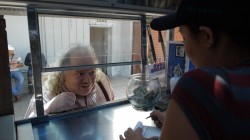Cinema | November 16th, 2016

In Laura Gabbert’s “City of Gold,” which unfolds like a gustatory companion to Thom Andersen’s “Los Angeles Plays Itself,” chef Andrew Zimmern summarizes the appeal of Pulitzer Prize-winning subject Jonathan Gold’s approach to food writing by saying, “…the great human ill is contempt prior to investigation.” That statement, which alludes to the way in which Gabbert weaves together her portrait of another celebrated, middle-aged white man by focusing as much on Los Angeles as geography/idea as she does on actual restaurant criticism, could also refer to those unconvinced by the sound of the filmmaker’s warm and sunny applause.
Inkoo Kang, who wrote that one of the movie’s shortcomings was a “probably inadvertent white savior narrative,” and Godfrey Cheshire, who detects the odor of “febrile self-consciousness,” raise worthwhile arguments regarding the privilege and elitism that could and probably should be addressed in a story where the democratization of culinary culture rubs shoulders with other established bastions of high art (especially when masquerading in the street at food trucks and strip mall storefronts). But Gold loves punk rock and hip hop as much as classical cello, and most – myself included – aren’t going to be inclined to hate on him even if the movie fails to adequately unpack class, economic, and racial segregation.
The majority of critics and viewers are more likely to marvel at Gold’s appetite for fresh tastes, sounds, sights, and conversations, recognizing that one of the things Gabbert does very well is communicate the universal desire for Epicurus’ ataraxia – that lucid state of happiness and tranquility grounded in an appreciation of the here and now. In one of the movie’s best explanations of Gold’s charm as a writer, Reuters editor Sue Horton pinpoints Gold’s affinity for the second person, a technique that invites identification even if we’ve never dined on deer penis, hagfish, or as Gold himself has remarked, the “dodgier bits of the animal.”
Visits to past and recent favorite eateries allow Gabbert to fetishize dozens and dozens of images of what the less-charitable might refer to as “food porn.” From Chengdu Taste to Guerrilla Tacos to Jitlada to Kogi to Meals by Genet, the parade of dishes will continue to inspire long lines for residents of L.A. and pangs of longing and jealousy for those who do not live there. Prowling neighborhoods in search of good eats demands driving music, and Gold’s affinity for an Eddie Hazel guitar solo, the early 17th century lute song “Flow, My Tears,” and Dre and Snoop trading verses on “Nuthin’ but a ‘G’ Thang” is as contagious as his enthusiasm for a new taqueria.
In 2013, Gold spoke at the UCLA School of Art and Architecture’s commencement, and Gabbert includes some of his remarks near the end of the documentary. Gold identifies himself as “an emissary from the world of failure,” mounting what is in essence a compelling argument on behalf of a liberal arts education as he articulates how we are shaped by the sum of our experiences – even if, especially if, we don’t end up doing what we originally planned. “City of Gold” might favor fantasy over reality, but it’s difficult not to be taken in by the observations that we are united by food and that cooking is what makes us human.
March 2nd 2026
February 23rd 2026
February 23rd 2026
February 16th 2026
February 16th 2026


_(1)__293px-wide.jpg)

_(1)__293px-wide.png)
__293px-wide.png)